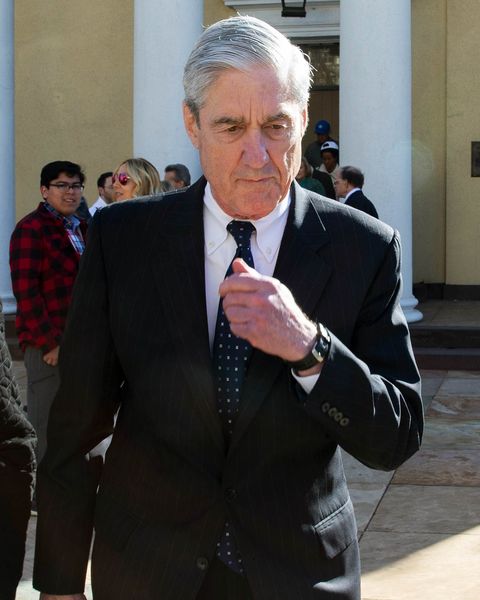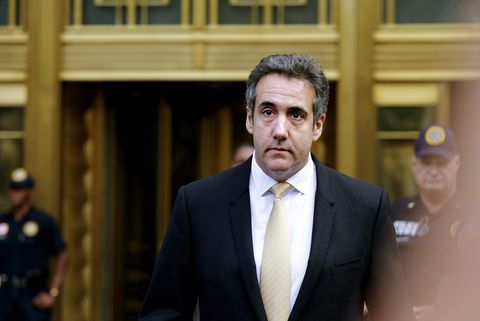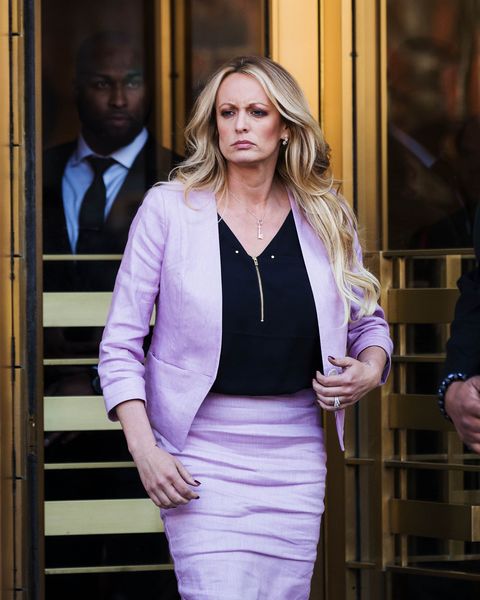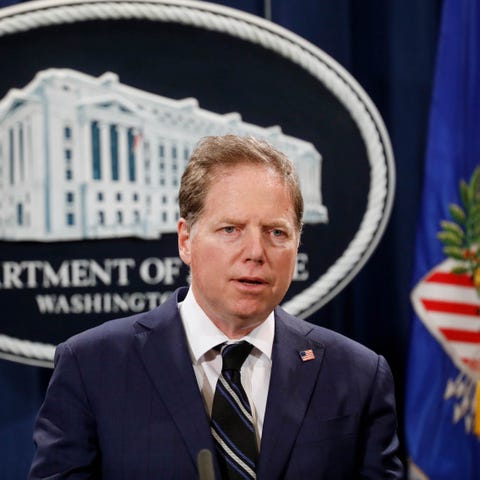Esquire
Donald Trump’s Legal Problems Are Far From Over. Just Look at What’s Happening in New York.
The enormous volume of coverage and commentary regarding Mueller’s failure to “establish” criminal collusion has obscured Donald Trump’s legal troubles in New York.
By Ryan Lizza April 2, 2019
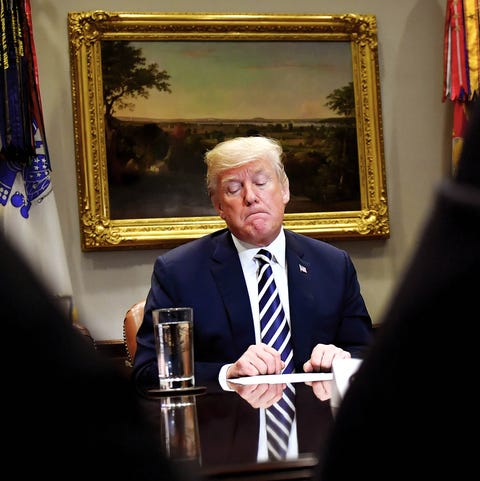 GETTY IMAGES
GETTY IMAGES
While there are still a lot of questions about what’s actually in the Mueller Report, the legal danger for Donald Trump from the Special Counsel in D.C. has largely passed. The focus now is about to move to New York, and the legal danger for Trump in his hometown. And at the heart of Trump’s exposure is a man whose name has recently been sidelined: his former attorney, Michael Cohen.
In D.C., Special Counsel Robert Mueller looked at what was both the most serious accusation against Trump and also the one that was the least likely to be proven: that Trump affirmatively and criminally conspired with Russians in their twin plots to hack and distribute Democratic emails and spread disinformation through social media.
It was not exactly preposterous that Trump, rather than simply being the primary beneficiary of this foreign interference plot, took some step that crossed the line into a criminal conspiracy. After all, he publicly cheered the hacking and dumping efforts—even after it was known that they were being conducted by a hostile government. As president, he spent months denying that the Russian government was behind the disinformation campaign, despite irrefutable evidence from his own intelligence advisers. He repeatedly attacked and discredited anyone investigating the Russian plot. He worked to tilt policy in a curiously pro-Russia direction (at least when he wasn’t overruled by Congress or his advisers). His topmost campaign and personal advisers—Flynn, Manafort, Stone, Cohen—lied to prosecutors or congressional investigators.
But even though Trump acted like a person with something to hide, it was always unlikely that he was stupid enough—or, somewhat conversely, even had the ability—to have engaged in a criminal conspiracy with the enemy. If you’re reaping the rewards of someone else’s criminal conduct, what’s the point of joining the conspiracy yourself?
The enormous volume of coverage and commentary regarding Mueller’s failure to “establish” criminal collusion—and the predictable response from Trump and his defenders that that single conclusion, at least as filtered through the attorney general, means that Trump is in the clear here, there, and everywhere—has obscured his legal troubles in New York.
New York doesn’t just mean the Southern District of New York, the federal prosecutorial outpost in Manhattan. The state’s Attorney General and its Department of Taxation and Finance also have active investigations of Trump entities. Across the East River, in Brooklyn, the Eastern District of New York is reportedly looking at Trump’s inaugural committee. But Trump may have the most to fear from SDNY.
And if you want to understand the potential danger to Trump from SDNY, it’s worth re-visiting the case of Michael Cohen.
Cohen, who is scheduled to start a three-year jail sentence in May, shows what can happen when a prosecutor aims all of his enormous legal powers on a single target. It is not true, though it is often alleged by Trump supporters, that the Mueller investigation began with the Steele Dossier. (The FBI opened its inquiry in the summer of 2016 after an Australian diplomat reported that a Trump aide may have had a heads up about the email hacking plot.) But in Cohen’s case the dossier is probably what triggered the FBI’s aggressive investigation of his life.
The document included a murky claim that Cohen had met some Russian agents in Prague, and, according to someone close to Cohen, he believes that it was that allegation that caused Mueller to target Cohen in July 2017, just weeks after Mueller was appointed special counsel.
The 900 pages of search warrants and other documents that were recently released in the Cohen case lay bare how much of someone’s life a prosecutor can expose when on a focused hunt for a crime. Starting in 2017, prosecutors were in Cohen’s phone and email. They accessed his location data. They grabbed his banking records. And the following April three dozen agents raided his home, law office, hotel, and safety deposit box, seizing millions of pages documents. (Though the only thing they took from the safety deposit box, which was primarily used to store his wife’s jewelry, was a T.D. Bank passbook from his son’s bar mitzvah.)
When New York prosecutors, who received the case from Mueller, finished with Cohen very little of what he plead guilty to related to Russia. There was no mention that he was ever in Prague meeting with Russian handlers in his plea agreement. Instead, he was charged with:
• hiding income from the IRS;
• lying to a bank to secure a Home Equity Line of Credit (HELOC)
• violating campaign finance laws by paying Stormy Daniels the $130,000 she demanded to keep her from disclosing her relationship with Trump during the election;
• and, in the one Russia-related charge, lying to Congress about the timing of when Trump ended his pursuit of a deal to build a tower in Moscow.
Proving collusion with Russia is difficult. Proving bank fraud is easy. Cohen had plenty of equity in his home to justify the HELOC, but he failed to disclose some large liabilities on the loan application. Bank fraud. (Cohen did not need the HELOC to pay Daniels, as is often reported. He had several million dollars in his bank account. But he knew he couldn’t easily explain to his wife why he was paying six figures to a porn star so he had to find an alternative stream of money.)
Cohen did not set up some elaborate tax cheating scheme with offshore accounts and phony records—he was no Paul Manafort—but he did fail to pay more than a million dollars in taxes over five years. As soon as he knew he was busted he sent a check to the government. Too late. Similar cases are often settled with the IRS through a civil process where fines are the norm, but SDNY made it a criminal case. The campaign finance violation has been attacked by some conservative critics as a stretch because Trump would arguably have paid Stormy even if he wasn’t running for president, and because a similar case against John Edwards resulted in a hung jury and the government declined to re-prosecute it. But Cohen felt he had no choice but to plead guilty, fearing he might otherwise face even more dire charges against him as well as his wife, who was involved with his businesses.
SDNY prosecutors treated Cohen like a hardened criminal and they made it clear they wanted his superiors at the Trump Organization and other institutions put on notice. In a sentencing memo, the prosecutors argued in favor of “a significant sentence of imprisonment” on the tax and bank charges in order to “deter tax evasion and other financial crimes by sending the important message that even powerful individuals cannot cheat on their taxes and lie to financial institutions with impunity.”
The prosecutors were even more outraged by the campaign finance plot:
“First, Cohen’s commission of two campaign finance crimes on the eve of the 2016 election for President of the United States struck a blow to one of the core goals of the federal campaign finance laws: transparency…. Effective deterrence of such offenses requires incarceratory sentences that signal to other individuals who may contemplate conduct similar to Cohen’s that violations of campaign finance laws will not be tolerated. Particularly in light of the public interest in this case, the Court’s sentence may indeed have a cognizable impact on that problem by deterring future candidates, and their ‘fixers,’ all of whom are sure to be aware of the Court’s sentence here, from violating campaign finance laws.”
The problem for Donald Trump in all this? He directed Cohen to make the payments and signed checks to Cohen to cover the payments while he was president. Another of the checks reimbursing Cohen was signed by Donald Trump Jr. Forget about whether you agree that this is a strong case or not, but simply based on the way that they treated Cohen, how can the prosecutors here send Cohen to jail, condemn his behavior as an attack on the flag and apple pie, and simply walk away from holding his co-conspirators accountable?
And that’s just the campaign finance case, where we know most of the facts and actions taken by the president and his son. Now imagine if prosecutors are digging into Trump’s finances and companies the same way they dug into Cohen’s. Cohen has already given them a roadmap to potential charges against his former boss. In his public and private testimony before Congressional committees, Cohen alleged a long list of behavior by Trump and his companies that are the sorts of things that might sound minor, and which have received surprisingly little coverage while everyone has been focused on collusion, but in an aggressive prosecutor’s hands could amount to felonies.
Cohen was dismissive of the idea that Trump colluded with the Russians, but he painted the president as a liar and a con man and told a series of incriminating stories. Did Trump falsify his financial statements in trying to obtain a loan with Deutsche Bank when he tried to buy the Buffalo Bills in 2014? Did he lie to any other financial institutions by inflating his net worth? Did he submit a false insurance claim? Did any members of a joint defense agreement, which included Ivanka Trump and previously included Cohen, suborn perjury? Did Trump break the law when he dangled pardons for Cohen after the April raid on Cohen’s home and offices, an issue that a source with knowledge says is being looked at by SDNY?
The point here is not that Trump is a criminal or to engage in anti-Trump fantasies about the president being taken away in handcuffs. It is simply to point out that the real danger for Trump—and his closest family members—is from zealous prosecutors in New York who have already shown in the Cohen case that it is rather easy to find criminality, especially around taxes and banking, when the target is, to put it mildly, less than scrupulous with his books. SDNY is still bound by the Justice Department’s policy against indicting a sitting president, and Geoffrey Berman, the U.S. Attorney running SDNY, is considered to be temperamentally conservative. But his team has shown they do not mess around—and members of Trump’s family who have also served in the Trump Organization are not sitting presidents.
While some people, and surely Cohen himself, might look at the Cohen case and think that three years in prison is too long for the underlying crimes, the prosecutors looked at Cohen’s behavior and saw something larger. “Taken alone, these are each serious crimes worthy of meaningful punishment,” the prosecutors wrote. “Taken together, these offenses reveal a man who knowingly sought to undermine core institutions of our democracy.” It is difficult to read that and not conclude that there is real danger for Trump in New York.

